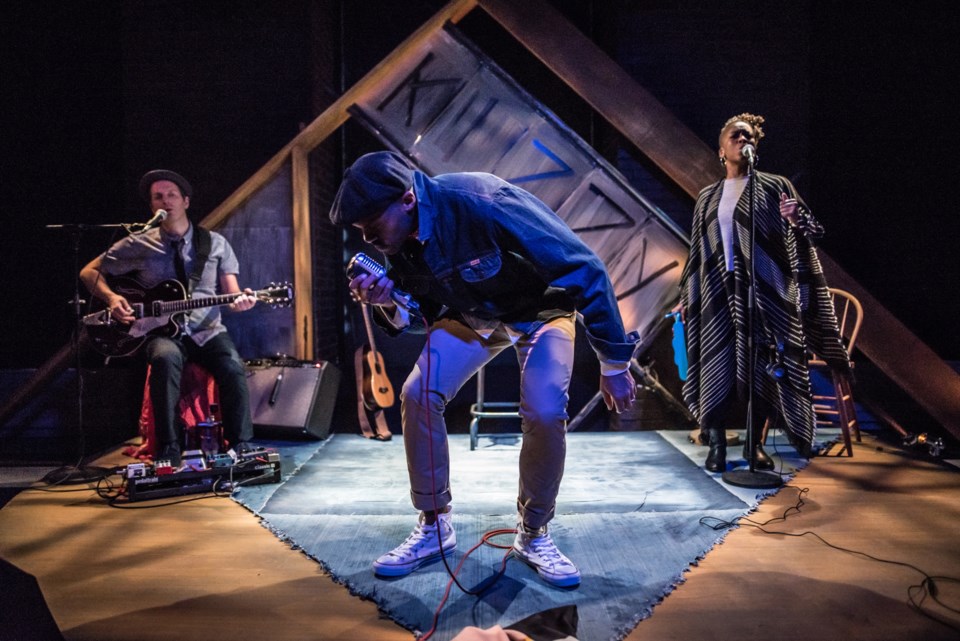When Khari Wendell McClelland wanted to connect to his great-great-great-grandmother Kizzy ŌĆō an escaped slave who made the arduous journey to Canada in the 1850s and about whom there was more family lore than hard facts ŌĆō he turned to the music that might have accompanied her as she made her escape from America.
The result of this exploration is Freedom Singer, a music-driven theatrical experience co-created by and that makes a stop in ┬ķČ╣┤½├Įė│╗Łnext week as part of its national tour.
uses music as a vehicle to understand a distant and sometimes misunderstood past, says Kushnir during a recent phone interview.
ŌĆ£[McClelland] felt inspired as an artist to imagine what KizzyŌĆÖs life might have been like, and because heŌĆÖs a musician ŌĆōheŌĆÖs a singer-songwriter ŌĆō his creative impulse was to find the songs Kizzy may have been singing at that time, and likely the songs that accompanied her as she escaped slavery in the U.S.ŌĆØ Kushnir directed the production and his Toronto-based theatre company, Project: Humanity, uses journalistic research and verbatim texts to explore social issues.
Prior to Freedom Singer, Kushnir says that much of his understanding of CanadaŌĆÖs role in the Underground Railroad came from that ╠²ŌĆō but ŌĆ£you can do just minimal research and discover the ways that that mythology and that narrative [of Canada as a pure safe haven] are flawed,ŌĆØ he says. He points to the Komagata Maru incident, the Chinese Head Tax, residential schools and CanadaŌĆÖs own history of slavery as evidence that ŌĆ£there are any number of things that compromise the notion that Canada is a pure haven for those fleeing oppression.ŌĆØ
The discussion is more relevant than ever in the age of Trump, says Kushnir; Freedom Singer was on a tour stop in Winnipeg when there was an influx of Americans crossing the Manitoba border to seek refuge in Canada. ŌĆ£There is value in the mythology, and there is value in the ways that Canadians have stepped up and have taken care of those facing oppression, but itŌĆÖs a complicated story,ŌĆØ says Kushnir. ŌĆ£What brought me to this project, given my interest as an artist is, how complicated a story can we tell, and can we celebrate and also reflect and discover the ways in which we could be better?ŌĆØ
At its core, Freedom Singer is the musical journey of one man determined to connect with his ancestor ŌĆō through storytelling, spoken word, and archival recordings, as well as songs from the Underground Railroad (which are re-imagined through hip-hop, soul, gospel, R & B, and various folk aesthetics) ŌĆō so that his ancestor can be seen. ŌĆ£I think itŌĆÖs easy to think of Kizzy as an ancestor, a slave, a fugitive, someone who has this remarkable and tragic story that resulted in escape, but Khari wants her to be a woman first,ŌĆØ says Kushnir. ŌĆ£He wants her to be a human being first.ŌĆØ
ŌĆ£ItŌĆÖs going to be a joyful experience,ŌĆØ he adds. ŌĆ£People will take their own personal journey through this. The piece is a big invitation, and I would love people in ┬ķČ╣┤½├Įė│╗Łto take us up on that."
╠²
Freedom Singer╠²is performed by McClelland along with Toronto soul singer and ┬ķČ╣┤½├Įė│╗Łguitarist .
╠²
ŌĆó Freedom Singer╠²runs Oct. 7-18, at varying times, on the Goldcorp Stage at the BMO Theatre Centre (162 West 1st Ave.)╠² $22 - $32.


